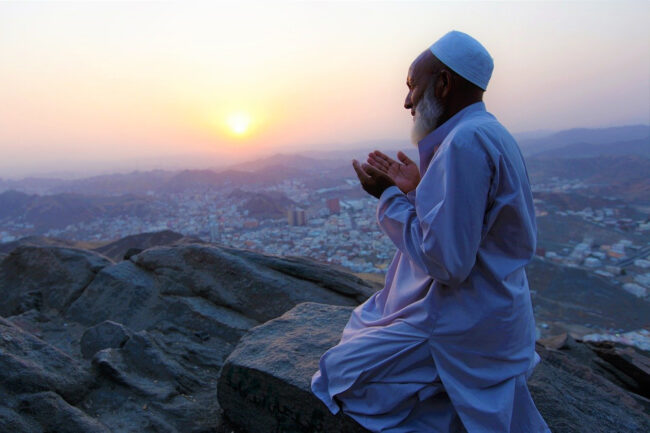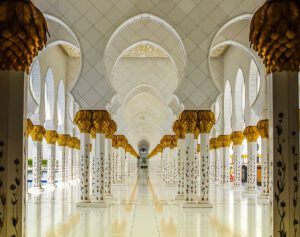SUNSET TUESDAY, MAY 19 and SUNSET SATURDAY, MAY 23: The holiest night of the Islamic year arrives for Muslims worldwide with the Night of Power (Laylat al-Qadr). Known by many names—Night of Value, Night of Destiny, Night of Measure—Muslims note the anniversary of the night the Quran was first revealed to the Prophet Muhammad via the angel Gabriel. (Note: Muhammad did not reveal precisely when the Night of Power occurred, though the 27th day of Ramadan is a traditionally held date; however, as many of the odd-numbered nights in the last 10 days of Ramadan as possible are still observed.)
It is believed that on this sacred night, verses of the Quran were relayed to Muhammad in the year 610 CE, and angels descended to earth for the event. If a devoted Muslim prays in earnest for forgiveness of sins on Laylat al-Qadr and reads the Quran, it’s believed that the night is “better than 1,000 months.” Sins are forgiven and blessings are manifold.
An Eid Unlike Any Other

Cupcakes for Eid. Photo by The Baking Tray, courtesy of Flickr
“Even the oldest people living today cannot recall a Ramadan like this,” Algerian journalist Larbi Megari told us this week via Skype from his home. He followed up by email with this account of the startling reality of an Eid without crowds.
“Officially, we are hearing there will be no public Eid prayers in Algeria this week—and in most of the Arab countries. Authorities are asking people to hold Eid prayers at home, which is difficult. Eid prayers are supposed to include a Khutbah, and not everyone is capable of delivering such a message at home.”
Though rare, some countries—such as Iran and Pakistan—have allowed the resumption of communal prayers; however, strict social distancing measures will be enforced.
A RAMADAN IN QUARANTINE: SOCIAL ASPECTS
In The New York Times, Amelia Nierenberg reported on Breaking the Ramadan Fast in Quarantine. She explained: “For many Muslim families, Ramadan is one of the most social months of the year. … It is a month of meals eating with intention, ending in a joyous celebration: Eid al-Fitr, which begins the evening of May 23.”
Interested in 16 tips for celebrating at home? This article suggests ways to make Eid in quarantine special.
Participate in a 13-day virtual celebration of Eid: Check out this site, hosted by Asia Society’s Texas location, for craft how-to videos, cooking videos, read-alongs and more, part of the free online programming.
Still, in spite of virtual celebrations and “gatherings,” Muslims the world over are experiencing often painful interruptions in lifelong traditions. As Eid is a very social holiday—and a major component of the observance is time in a mosque—Muslims are gearing up for a very different Eid this year.
From Jerusalem, Adam Rasgon reported: A Ramadan Unlike Any Since the Middle Ages. In The Times, he wrote: “The last time Muslim worshipers were kept out of the Aqsa Mosque compound throughout the entire month of Ramadan was when crusaders controlled Jerusalem in the Middle Ages.”
Reporting from Algeria, Larbi explains, “Authorities have announced that there will be no visits to hospitals during Eid day. We have the habit in Algeria of visiting hospitals where there are sick people who are far away from their families, especially here in the capital where the biggest hospitals are receiving sick people from other towns and cities.
“This year, there will be a total curfew during the two-day Eid. Authorities have forbidden family visits that usually take place during these two days. The religious-affairs ministry even issued a fatwa forbidding family visits during Eid.
“One of our favorite traditions is sharing sweets and cakes for Eid—but we won’t be making them this year for the simple reason that no one will visit us at home to give them these sweets. So many things are different this year. Usually, people wear new clothes for the Eid—so important that new clothes are a symbol of Eid. But, this year, shops are closed. The message widely shared on social media this year is: Instead of wearing new clothes, put on your best clothes.
“Finally, we cannot remember our loved ones with cemetery visits, which is an important habit in Algeria during Eid. Authorities do not want public gatherings—even in our cemeteries.”
‘EID SA’ID!’
(HAPPY EID!)
That’s the way to greet Muslim friends, if you care to follow the traditional custom of wishing friends, neighbors and co-workers the best in this festive time.
Note: Spellings vary, and you may see the holiday spelled Eid ul-Fitr as well.
Before sunrise on Eid al-Fitr, Muslims pray, bathe and put on their best clothing. A small breakfast—usually including dates—is consumed, and Zakat (charitable giving) has been completed.
While adherents typically would spend ample time enjoying the company of family and friends and attending carnivals and fireworks displays, social distancing measures will prevent most of these types of activities in 2020.
THE END OF RAMADAN AROUND THE WORLD
With nearly one-quarter of the world’s population observing the Islamic faith, it is significant to note that, unlike most Muslim holidays—which may or may not be observed by all Muslims each year—the two Eid holidays (Eid al-Adha and Eid al-Fitr) are always commemorated universally.




Tell Us What You Think